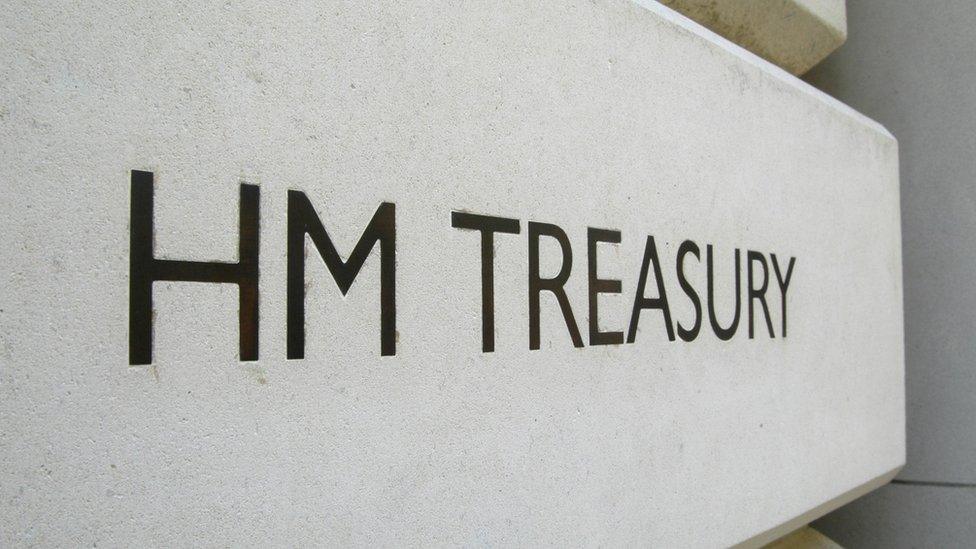General election 2017: May says Tories would not raise VAT
- Published
The Conservatives have "absolutely no plans" to increase tax, the prime minister says
Theresa May says a Conservative government will not raise VAT if she wins the general election.
But the PM declined to back a 2015 Tory pledge that also ruled out rises in income tax and National Insurance.
Mrs May said she would not be making "specific proposals" on taxes unless she is "absolutely sure" they can be delivered.
Labour promised "low taxes for low and medium earners", claiming the Tories favoured "low taxes for high earners".
Asked whether she would be repeating ex-PM David Cameron's "five-year tax lock", covering income tax, National Insurance and VAT until 2020, Mrs May told the BBC's Andrew Marr Show: "We have absolutely no plans to increase the level of tax.
"But I'm also very clear that I do not want to make specific proposals on taxes unless I am absolutely sure that I can deliver on those."
Speaking later on the Peston on Sunday show, she added: "We have no plans to raise the level of tax.
"In relation to specific taxes, we won't be increasing VAT."
Labour has also ruled out a VAT rise.
Jeremy Corbyn: "There will be tax changes, but they will be very very much at the top end"
Leader Jeremy Corbyn said: "We are the party that wants low taxes for low and medium earners. The Conservative Party are the party that wants low taxes for high earners. We look at things the other way round.
"So yes, there will be changes, but they will be very very much at the top end."
Labour is also unveiling a "20-point plan" to tackle what it calls the "rigged economy", including increasing the minimum wage, banning zero hours contracts and ending the public sector pay freeze.

Analysis by Leila Nathoo, BBC political correspondent

Talk of tax rises during an election campaign is a risky strategy - and up until now Theresa May has been careful to avoid getting into specifics.
The Chancellor, Philip Hammond had hinted he wanted to ditch the so-called "tax-lock" - to give him more flexibility to manage the economy.
Now the prime minister has suggested she's prepared to revise the previous Tory manifesto commitment, though she insists the Conservatives are the party of lower taxation and she wants to reduce taxes for "working families".
For Labour, it's about where the tax burden falls - Jeremy Corbyn claims the rich and businesses must pay more, while he's promising to protect low and middle income earners from any increases.
But extra funding is needed for schools, hospitals and social care - so whoever wins the election, the money will need to be found from somewhere.

On the Marr show, Mrs May suggested the "triple lock" protecting the state pension could be changed, saying state pensions would continue to rise, with details of how this will be calculated to be revealed in the Tories' manifesto.
The triple lock ensures the state pension increases in line with wages, inflation or by 2.5% - whichever is highest.
She was asked about reports NHS nurses have been forced to use food banks, saying there were "many complex reasons" why people used the facilities and that a strong economy will lead to "secure jobs".
And she rejected claims she was "in a different galaxy" to the rest of the EU on Brexit negotiations, repeating her view that no deal would be better than a bad one.
Lib Dem leader Tim Farron: "The prime minister is heading for a colossal coronation on 8 June"
After the 27 EU leaders agreed their Brexit negotiations, the PM said there was "good will" on both sides about settling the issue of EU nationals living in the UK, and Britons elsewhere in Europe.
She said recent comments by EU figures showed that talks could be hard, and stressed her determination to reach agreement on a trade deal at the same time as settling the terms of the UK's exit.
The EU wants to tackle the issue of any "divorce bill" for the UK at an early stage of the process.
Mrs May said EU leaders were keen to "start discussions about money", but added: "I'm very clear that at the end of the negotiations we need to be clear not just about the Brexit arrangement, the exit, how we withdraw, but also what our future relationship is going to be."
'Colossal coronation'
Lib Dem leader Tim Farron told the Marr show the UK "desperately needs a strong opposition", saying that Lib Dem success was the only way to prevent the "calamity of hard Brexit".
A Conservative majority was "not in question" and Mrs May was heading for a "colossal coronation", he predicted.
He said the decision to call the general election had been motivated by a "cold, calculated desire to do what's best for the Conservative Party".
Plaid Cymru leader Leanne Wood told the Sunday Politics show any Brexit plan that threatened Welsh jobs would be "extreme" and "unacceptable".
Former SNP leader Alex Salmond said his party would provide "real opposition" to the Tories on public spending cuts.